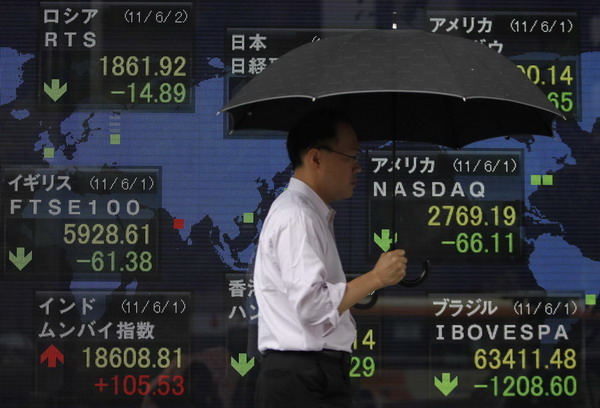Asia-Pacific
Nikkei falls sharply on political turmoil in Japan
(Agencies)
Updated: 2011-06-02 14:15
 |
Large Medium Small |
|
 A businessman walks past an electronic board displaying major market indices around the world outside a brokerage in Tokyo June 2, 2011. [Photo/Agencies]
|
|
||||
"A political vacuum is unavoidable," said Daisuke Uno, chief strategist at Sumitomo Mitsui Banking Corp. "As the global equity rally based on economic optimism since last November is running out of steam, Japanese shares are suffering from problems both at home and abroad, and their prices will be coming under pressure."
The Nikkei share average fell 1.5 percent to 9,574.09 in early afternoon trade, giving up a large portion of the gains accumulated over the past two sessions.
The broader Topix dropped 1.5 percent to 826.63.
The fall was slightly smaller than the 2.2 percent decline in the Dow Jones industrial average on Wednesday, which analysts say is natural given that Japanese shares underperformed during the rally in the US and in other developed countries' stocks in recent months.
Wall Street shares made a dismal start to June, typically a weak month for the market, after both private payroll data and a key manufacturing survey missed estimates.
In the Nikkei, support is seen around 9,400, a low hit in late April and May. Many market players say there are few reasons to sell sharply below that level as Japanese shares are already trading at around book value.
But market players also said buying by foreign investors - a major driving force behind the Nikkei's rebound from a two-year low right after the earthquake and nuclear accident in March - appears to be waning.
Data from Japan's Ministry of Finance showed on Thursday that foreign investors sold a net 83.2 billion yen of Japanese shares last week, their first net selling in nine weeks in the data series.
Political chaos
While Japan's chaotic politics could further dampen appetite, the index may not be significantly affected by the outcome of the no-confidence vote, some analysts said.
"The market may not be affected significantly by the outcome of the vote. The state of the US economy and Greece's budget problems will likely remain its key drivers in the mid-term," said Tsuyoshi Segawa, an equity strategist at Mizuho Securities.
A lower house session was expected to vote on the no-confidence motion around 3 pm (0600 GMT).
Meanwhile, carmakers underperformed hit by weak US May sales, with Toyota Motor Corp falling 3.1 percent to 3,275 yen, Honda Motor shedding 2.4 percent to 3,045 yen and Nissan Motor Co slipping 3.0 percent to 783 yen.
| 分享按钮 |



